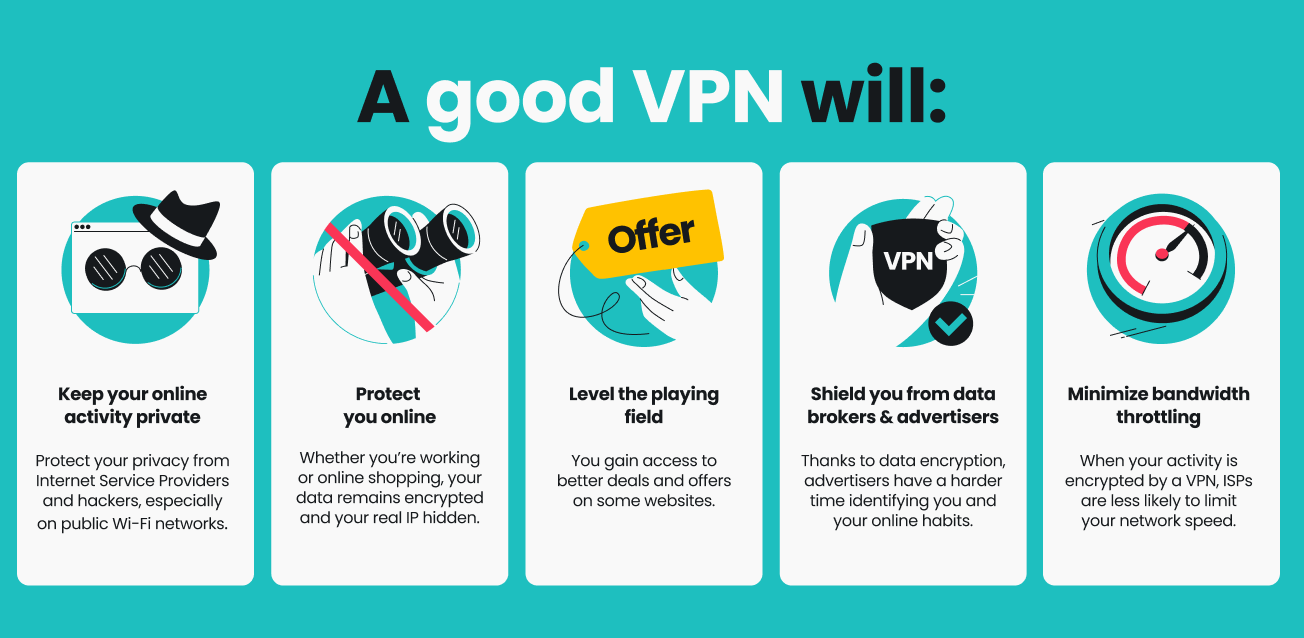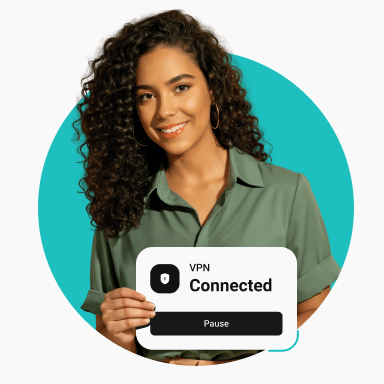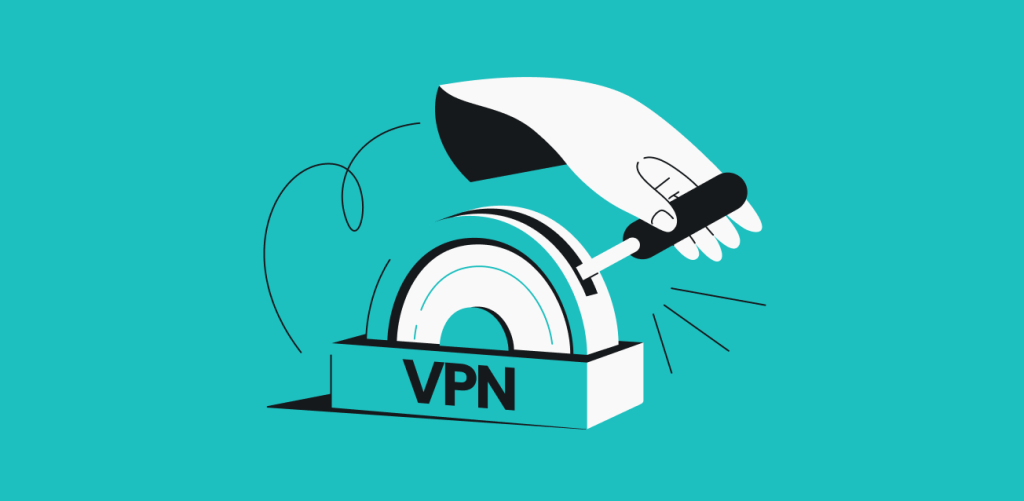A VPN (Virtual Private Network) is vital to making your online life more private and secure. The advantages of using a VPN go way beyond protecting your internet connection, but there are some limitations worth noting.
Let’s explore the top VPN benefits and possible drawbacks to see how a VPN can improve your online experience.
Top 5 benefits of using a VPN
Most of us can benefit from using a VPN for our everyday browsing activity. Here are the top 5 benefits of VPN apps for internet users:
1. Enhanced privacy
A VPN masks your IP (Internet Protocol) address by replacing it with the IP of a VPN server, making it harder for websites and online services to detect your real location and identity while you surf the web.
A VPN service also reduces tracking from advertisers, data brokers, and other prying eyes by obscuring your internet activity. This added layer of privacy lowers the chances that companies will be able to link your online behavior back to you.
2. Improved security
A VPN is key to getting a safer internet connection. By encrypting your internet traffic, a VPN makes it more difficult for hackers, ISPs (Internet Service Providers), and government agencies to intercept or read your data.
A VPN client scrambles your traffic, making sensitive information like passwords or credit card details indecipherable to cybercriminals and internet snoops. Since your online activity can’t be logged or sold to third parties, an encrypted tunnel also lowers the risk of ISP tracking.
3. Access to home content abroad
Traveling overseas often means not being able to access the same online services you enjoy at home due to regional restrictions. You may have trouble reading your local news, logging into your bank, or seeing prices in your local currency.
A VPN lets you connect to servers in your home country, allowing you to use a local IP address. To the rest of the web, it’ll seem like you’ve never left your living room. Use a private network to access the sites most important to you — in your language — even when you’re on the go.
4. Greater internet freedom
In some countries, oppressive governments impose strict internet censorship, blocking access to news websites, social media platforms, and other online content.
One benefit of a VPN is that it may help you bypass these limitations by routing your internet traffic through servers in different locations. This allows you to access the web as if you were in a less restrictive region, which is especially important for journalists, activists, and anyone who wants to stay in the loop without intrusive government censorship.
5. Reduced activity-based bandwidth throttling
ISPs can deliberately limit your internet speed based on traffic type, especially if you frequently game, stream, or download large files. VPNs make your online traffic unrecognizable, so they’re effective in combatting this traffic-based form of throttling.
Your ISP won’t see what kind of data-intensive activity you’re up to, so they won’t be able to restrict your speeds based on the websites you’re visiting. As a result, VPN connections aren’t just safe — they can also be faster.
VPN pros: real-world use cases
When choosing whether or not to get a VPN, it’s important to understand the pros and cons of these tools. Let’s first explore VPN advantages with some practical, real-world use cases.

Protection from third-party tracking
ISPs and other third parties regularly track your online activity to build detailed profiles of your browsing habits, search queries, and location. This data may be sold to advertisers to create targeted ads or used to restrict your access to certain content.
By using a VPN, you mask your IP address and decrease the chances of these entities tracking your online movements. A private network reduces the amount of personal data exposed to websites you visit, so you get more peace of mind knowing that your data is secure and that you’re harder to monitor.
Instead of relying on unsecured internet traffic vulnerable to identity theft or data leaks, VPN users get a safer, more private browsing experience.
Secure access on public Wi-Fi
Public Wi-Fi networks are convenient, but they’re also notoriously easy targets for cybercriminals. In fact, 18% of people have experienced some kind of security issue on public Wi-Fi.
How can a VPN help?
A VPN creates an encrypted tunnel for the data you send over public Wi-Fi, making it much harder for anyone to eavesdrop on your online activities. You can browse, shop, and communicate with confidence, even if your network isn’t particularly secure.
Finding better deals online
Certain online retailers or travel sites display different prices based on your location or browsing history. While some differences are based on objective criteria like shipping costs, it’s always worth checking to see if you’re being subjected to price discrimination.
When you mask your IP address with a VPN, you change your virtual location. This VPN benefit can be a useful way to find better deals and discounts from different regions, which is especially handy when booking flights and hotels or purchasing online subscriptions.
Elevated online banking security
Online banking can be risky, as hackers often target banking sessions to steal sensitive information like account details, login credentials, and financial transactions. A VPN shields your online banking with an extra layer of security by encrypting your internet connection. As a result, the chances of anyone intercepting your data are greatly reduced.
A VPN client helps keep your communication with the bank’s website private. Even over public Wi-Fi or unsecured networks, the encryption process safeguards your sensitive financial data and reduces the likelihood of unauthorized access or fraud.
Safe remote work connections
With more people working remotely than ever before, secure connections to company networks and data have become essential. A VPN ensures that your connection to your employer’s network is encrypted and helps protect sensitive company information from hackers. It also enables remote workers to safely access internal tools and resources, just like they were physically present in the office.
A VPN also benefits remote users by keeping communication and collaboration secure across distributed teams. Whether you’re accessing confidential files, joining video calls, or sending internal emails, a VPN is key to maintaining a safe, productive work environment.
Robust DDoS protection
A major VPN advantage for gamers is the ability to defend against DDoS (Distributed Denial of Service) attacks. These attacks often target gamers by flooding their connection with traffic and disrupting gameplay.
The thing is, a cheater has to know your IP address to execute a DDoS attack. When you’re gaming via a VPN connection, they’ll only get the VPN server’s IP. Playing with a VPN can improve your gaming experience and protect your session from malicious interference.
Stream sports while traveling
One of the underrated benefits of VPN usage is watching the sports content you’re used to seeing when you’re away from home. Sports fans often can’t watch their favorite teams while traveling, even if they’ve paid for a streaming subscription from back home.
A VPN for sports lets you connect to a server in your home country and stream the match-ups you’d be able to watch from your living room with your regular subscription. With a masked IP address, you can enjoy all the action you’re expecting to catch even while abroad.
Disclaimer: Please note that using Surfshark services for any illegal activities is strictly forbidden and violates our Terms of Service. Make sure that any use of Surfshark services for your particular activities conforms to all relevant laws and regulations, including those of any service providers and websites you access using Surfshark.
VPN cons: potential disadvantages
While a VPN is a powerful tool for enhancing your online security and privacy, these tools can have some drawbacks. Understanding these VPN disadvantages can help you decide if you need a VPN service and how to use one effectively.
Potential speed reductions
One VPN con is the fact that routing your traffic through a secure server often leads to slightly lower internet speeds. Your data has to physically travel over a longer distance to reach a VPN server, and the encryption process causes slowdowns as well.
Thankfully, there are ways to mitigate any speed reductions. First, VPN users can connect to a local server rather than one that’s farther away. You can also set up split tunneling to keep certain websites or apps unaffected by a VPN. This feature allows selected trustworthy pages and apps to bypass your VPN connection while keeping the rest of your internet traffic protected.
Compatibility issues
Unfortunately, not all devices are compatible with VPNs. Some smart TVs, game consoles, and other internet-connected devices may not directly support VPN connections, limiting your ability to secure certain apps and online services.
This issue can easily be remedied by setting up a VPN on a Wi-Fi router. With a VPN covering your router, any device connected to your network enjoys an encrypted private network. You get all-around network security, including on devices that otherwise aren’t VPN-friendly.
Unreliable performance
Not every VPN can deliver the same level of protection. Without robust encryption protocols, your browsing data and real IP address can leak. VPNs that lack security features like a kill switch or double VPN can also lead to a riskier online experience.
In many cases, underperforming VPNs are free ones. Apart from weak encryption and limited features, free tools can flood you with ads and force you to connect to slow, congested servers. Finding a reputable service with an extensive server network is key to getting VPN protection that actually works.
Cost
Many internet users see a VPN’s price as a disadvantage, but paid services are generally a better choice than free options. On top of data caps and slower speeds, free VPNs might even put your privacy at risk by selling user data to advertisers and other third parties.
For a reliable and secure VPN, consider subscribing to a trustworthy paid provider. Many offer long-term plans at a lower cost per month, so budget-conscious buyers can still find tools that are both high-quality and affordable.
Increased device load
Like any software, running a VPN can consume additional resources on your device. This is usually a bigger issue for things like smartphones and laptops that frequently rely on battery power.
Encrypting data adds to a device’s workload, which can lead to shorter battery life and slower performance. However, modern VPNs are optimized to minimize processing power and resource usage, so the extra security and privacy tend to outweigh any trade-offs in performance.
Legal concerns
While VPNs are legal in most countries, some governments have chosen to restrict or ban them outright. Violating these VPN laws may result in fines or other legal consequences.
If you travel to or live in such regions, look up the local laws regarding VPN use. Always check the legal status of VPNs in your area before using one, and don’t take any unnecessary risks.
VPN pros and cons at a glance
Here’s a quick overview of the main VPN benefits and drawbacks:
| VPN pros | VPN cons |
|---|---|
| Helps protect your privacy from ISPs and hackers | May slow your internet speed |
| Defends you on public Wi-Fi | Can be incompatible with some devices |
| Helps you avoid price discrimination | Free VPNs may be unreliable |
| Keeps you safer online, whether you’re gaming or checking bank accounts | Good VPNs often cost money |
| Makes remote working more secure | Can affect your device’s performance |
| Lets you access your regular sports streams while traveling | Access is restricted in some regions |
Final thoughts: VPN benefits outweigh the drawbacks
Having a VPN is worth it — the benefits of using one surpass any limitations you might come across. However, not all VPN providers are the same, so it’s important to do your research before committing to one.
Looking at factors like speed, device compatibility, and privacy-friendly logging policies, Surfshark is a reputable service that’s a great place to start.
FAQ
What is the primary purpose of a VPN?
A VPN (Virtual Private Network) gives internet users increased privacy and browsing freedom by creating an encrypted tunnel that secures your data, masks your Internet Protocol (IP) address, and helps protect your online identity.
What are the benefits of a VPN service for a business?
Using a VPN can bring the following benefits to your business:
1. Lower risk of data interception: with a VPN, you can protect sensitive business information from prying eyes;
2. Safe remote access: a VPN enables secure access to the company network and business websites from anywhere;
3. Greater privacy: by using a VPN, you keep business communications confidential.
What are the benefits of a VPN for personal use?
For personal use, a VPN helps with:
1. Online privacy: a VPN can help keep your browsing activity private;
2. Secure transactions: with a VPN, you can add an extra layer of protection to your online financial transactions;
3. Tracker-free browsing: a VPN will make it harder for advertisers to track your online behavior.
What are the benefits of using a VPN on my phone?
When using a VPN on your phone, you can enjoy:
1. Public Wi-Fi safety: you can use a VPN to secure your data on public Wi-Fi networks;
2. Privacy protection: a VPN keeps your online activities private from ISPs and internet snoops;
3. Secure online transactions: using a VPN adds an extra layer of security when banking or shopping online.
What are the benefits of using a VPN for online gaming?
When gaming, a VPN can be useful for:
1. DDoS protection: using a VPN will shield you against DDoS attacks from other players;
2. Safer gaming on public Wi-Fi: whether you’re gaming on a laptop, mobile device, or handheld console, a VPN helps keep your connection private and encrypted on sketchy hotel or airport Wi-Fi;
3. Escaping ISP-induced lag: with a VPN, you can minimize your ISP’s activity-based bandwidth throttling.
What are the benefits of using a VPN for streaming?
When using streaming services, you can use a VPN to:
1. Stream safely: using a VPN can enhance your privacy and security on your favorite streaming services;
2. Access home content abroad: a VPN allows you to watch the same shows and movies you watch at home while traveling;
3. Stay private: with a VPN, you can make sure your viewing habits stay private.
What are the negatives of VPNs?
Some cons of using a VPN are potentially slower internet speeds, legal restrictions in some countries, and the cost of paying for the tool. However, VPNs are legal in most countries, and a reputable VPN service shouldn’t have a major impact on your internet connection.
Can a VPN be tracked?
While a VPN makes tracking much harder, it’s not completely untraceable. A VPN encrypts your internet activity and hides your real IP address, but some websites can recognize IP addresses from a VPN. IP leaks and ISP monitoring can also reveal VPN usage.


